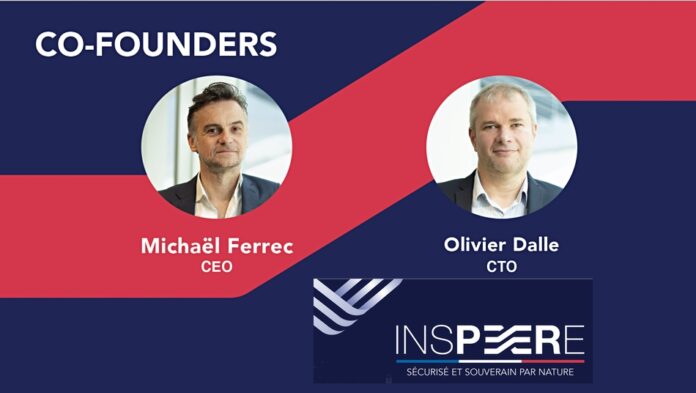Profile: French startup Inspeere believes a backup stored across six to nine peer sites in encoded and compressed fragments is effectively impervious to ransomware attacks and can meet sovereignty requirements as well as being green.
Inspeere’s technology is based on computer science research and a patent by University Cote d’Azur professor Olivier Dalle. He left academia after 20 years to co-found Inspeere with French serial entrepreneur Michaël Ferrec in 2018. Inspeere was initially self-funded by its founders, then helped by French institutions, and has just received a €600,000 ($647,240) investment from the Business Angels of the Grandes Écoles, Defense Angels, Arts et Métiers Business Angels, the NACO fund managed by M/Capital, BPI France, Airbus Développement and the University of Côte d’Azur.
The background is that organizations should back up up their data using a 3-2-1 principle – meaning three copies of the data on two different media types with one copy stored externally. But a backup copy is inherently vulnerable to malware attacks. If, instead, the external copy is split into fragments which are encoded and compressed and stored on different systems, then an attacker would have to recombine, decode and decompress all the fragments to capture the data.
Dalle presented Inspeere’s Datis software product to an IT Press Tour audience in Madrid. It uses blockchain-based (distributed ledger technology) peer-to-peer technology to accomplish this, holding a local copy and distributing the external copy among six to nine peer systems. Each member of the peer group provides disk space for the fragment copies and uses the other peer group members as recipients of its own encoded, compressed and fragmented backup files.
Essentially, Datis is is a peer-to-peer storage system marketed as a backup target. Each peer is has an x64 processor and runs Debian Linux with a ZFS filesystem. An incoming backup file is received by the system. It is compressed, encoded and split into fragments. The ZFS read-only snapshot and replication capability is used to distribute the fragments to the peer systems with Reed-Solomon error correction.
This can be configured as, say, four nodes with two error-correcting parity nodes, such that any three peer systems can reconstitute the whole file – thus protecting against peer system and fragment loss. Permanent peer failure is like a RAID rebuild process.
Dalle explained: “ZFS does the compression and encoding and replication. We add the splitting.” Datis itself has no access to customers’ data and its backup style is incremental forever.
Inspeere has tweaked ZFS so that a local ZFS system is actually based on dispersed and independent ZFS peers. It has technology to divide traffic streams in a network – called SPLIT-IT, SAVVY dynamic load balancing tech, and DATASMOOTH to optimize bandwidth.
A receiving peer site will treat stream slices as files. Restoration means the set of peers has to replicate slices back to the originator – just enough to rebuild the data, not all the distributed slices. So a restore can take less time than original backup process.
Datis can enforce sovereignty, as peers’ geo locations can be restricted.
Dalle said Inspeere can support S3 and does support UrBackup, which is popular in universities.
The startup has around 80 customers and is edge-site focussed. It says that, as peers support each other, no actual datacenter is needed to store the backup. Therefore Datis, compared to other datacenter-using backup systems, uses less energy in its operation.
“We target small vertical market communities – like schools,” Dalle said, and “we want to move up market to mid-market companies. We will need to be able to backup NetApp filers.” It is working through reselling partners and has one MSP. It may expand that channel.
We have here a small French backup target supplier with unique technology that is related to the web3, distributed storage technology used by Storj and Cubbit. Although it uses blockchain technology, it’s not into crypto and is quite happy using euros. Pricing for small customers starts at €100/month.
Find out more about Inspeere here.








